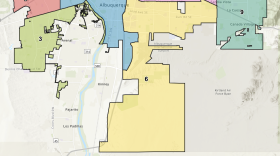As the race for Albuquerque City Council District 6 heads into a runoff election, the field has narrowed from four to two. Voters who came out for one of the two candidates who didn’t make the cut for the runoff, Kristen Raven Greene and Abel Otero, must now assess whether the platforms of Democrats Nichole Rogers or Jeff Hoehn better align with their values and expectations. The two differ greatly on their approaches to policing and public safety.
Crime is a top-of-mind issue for many voters in Albuquerque, which has seen record homicides and increasing violent crime in recent years.
While Hoehn identified crime as one of his top priorities to the League of Women Voters, Rogers said hers was poverty, of which crime is a symptom.
“That’s the root cause,” she said. “We can’t keep putting bandaids on crime without focusing on those upstream issues.”
As part of her approach to lift residents out of poverty, she proposes implementing a Guaranteed Income pilot program using cannabis taxes, rental assistance, and financial literacy support.
Hoehn said, while there’s some overlap in the issues, he doesn’t believe crime in Albuquerque is only poverty-driven.
“We know we have a criminal element in our city that is doing things like grand theft auto, that’s selling drugs,” he said. “And these are the folks who are preying on our citizens and they need to be stopped.”
He said tackling poverty isn’t the targeted solution to crime that the city needs.
“Addressing poverty is a long-term, multifaceted, wicked problem that we have to address. Here’s the challenge: Right now crime is out of control,” he said. “And I believe we can walk and chew gum. We can help our most vulnerable citizens in Albuquerque while getting our criminals off the street.”
He proposes ramping up police presence in the district through mobile command units near “problem properties” as part of the solution.
“These are the large, kind of RV units where police would be there 24/7, prepared to respond when things are reported,” he said of the units. “This is also a trust-building model where you would actually get to know your police, know that they care, and work alongside them — versus being afraid of them or concerned about calling them.”
The Albuquerque Police Department was the second most deadly police force in the nation over the last decade, according to the Mapping Police Violence Database. And the International District, one of the city’s poorest and most racially diverse neighborhoods, has been the target of federal, county and city special operations over the years. Some residents there say they feel over-policed.
When asked what he’d say to those residents who don’t feel safer with more cops around, Hoehn said “Let’s give each other a chance.”
“We’re all human beings, we all have a story to tell,” he said. “And when we know each other’s stories, when we hear each other's truths, that changes things.”
As a Black and Hispanic resident of the area, Rogers said she feels the over-policing. She agrees that trust building is needed, and wants to see APD put more resources toward actively engaging the community.
“You budget for what you care about,” she said.
She also said she wants to see more accountability measures, like tracking race and ethnicity data for traffic stops and patterns of biased policing among specific officers.
However, Rogers, like Hoehn, believes the city needs more officers.
She said she would like to build on her past work at the city’s Office of Equity and Inclusion to improve recruitment and retention at the department to alleviate its persistent staffing shortage.
Unlike Hoehn, however, she doesn’t think the community needs to see more cops in more places.
“We don’t need APD going to social service calls. We don’t need APD going to homeless calls,” she said. “We need to minimize the community’s exposure in that way.”
Both Rogers and Hoehn support increasing the capacity of the Albuquerque Community Safety Department to free up the police to focus more on violent crime.
Rogers said she will also serve residents who do feel safer with greater police presence and community surveillance.
“Again, that’s why community engagement is so important. We need to know: Where do people want to see that? And where are they OK with that?” she said. “But, bridging that, we want to minimize harm. And it’s not always by putting more police in an area.”
The District 6 City Council runoff election is Dec. 12, 2023. Early voting begins Tuesday, Nov. 21. It will pause on Thursday for the Thanksgiving holiday before picking back up on Monday, Nov. 27.






